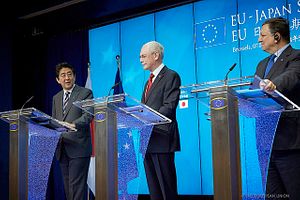Over the last couple of months, Japan has made a concerted effort to expand cooperation with Europe on cybersecurity. In December 2014 British and Japanese officials met to discuss possible cybersecurity threats in the run-up and during the Tokyo 2020 Olympics and Paralympics Games, based on the U.K.’s experience of hosting the games back in 2012. On December 12, the Japanese and French governments held a cyber-dialogue in Paris discussing critical infrastructure protection, the establishment of international norms, and joint efforts towards cybersecurity capacity building. This was followed by a Japan-Estonia cyber dialogue on December 17 and 18 with a similar agenda.
Japan’s effort is partially based on a new cybersecurity strategy adopted in June 2013. In it, Tokyo makes it clear that it is a strong supporter of a free, open and secure Internet, as well as the multi-stakeholders approach in governing the Internet. The strategy document outlines four basic aims: “Ensuring Free Flow of Information,” “Responding to Increasingly Serious Risks,” “Enhancing of Risk Based Approach,” and “Acting in Partnership on Shared Responsibilities.” The new strategy places a premium on cooperation with like-minded countries, as an additional document outlining Japan’s international strategy on cybersecurity cooperation, compiled by the Information Security Policy Council ( the lead agency on cybersecurity issues in Japan), lays out.
Next to the United States, Japan sees Europe as one of its principle allies in cyberspace. For example, both sides are committed to deepening their cooperation in combating cybercrime. In a commitment in the cybersecurity strategy document, Japan pledges to, “actively participate in the promotion of the Convention on Cybercrime (so-called the Budapest Convention) by assisting countries to become State Parties to the Budapest Convention and by conducting capacity building activities. Through promotion of the Budapest Convention, Japan seeks to contribute to the promotion of international cooperation and formation of international norms in the field of countering cybercrime.” The convention – drawn up with Japan’s input by the Council of Europe – is the world’s first international treaty to combat cybercrime and a major tool in advancing Europe’s cybersecurity norms.
Tokyo is already part of various regional and international cybersecurity cooperation initiatives on both the technical (such as cooperation among Computer Emergency Readiness Teams in the Asia-Pacific region) as well as the political level (e.g., the UN Group of Governmental Experts on Cybersecurity). Separate cyber cooperation agreements and dialogues exist with international organizations such as ASEAN, APEC, OECD, and NATO.
Yet Japan sees cooperation with Europe on cybersecurity in particular as more important than ever. One reason is the increasing threat posed by authoritarian regimes such as China to the multi-stakeholders model of internet governance (e.g., hindering the free flow of information and as a consequence undermining human rights online.), which runs counter to Japan’s idea of a free and open Internet.
During the 22nd EU-Japan Summit, held in Brussels in May 2014, the European Union and Japan emphasized this in a joint statement: “Facing more severe, widespread and globalised risks surrounding cyberspace and the need to protect human rights online, protection of a safe, open and secure cyberspace is needed. With this shared recognition, we have decided to launch an EU-Japan Cyber Dialogue, with a view to promoting cooperation on cyberspace through exchanges of our respective extensive experience and knowledge.” The first meeting of the EU-Japan Cyber Dialogue was held at the Japanese Ministry of Foreign Affairs in October 2014. Additional meetings are scheduled to be held in 2015.

































